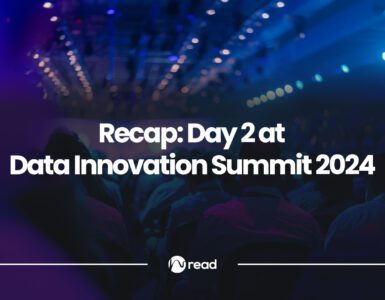In today’s data-driven world, organizations have vast data resources. However, deriving actionable insights is a challenge without the assistance of Artificial Intelligence (AI) in data management. In this interview, we spoke with Rakesh Singh. Rakesh is a data professional with 15 years of experience, primarily focused on data management, data integration, data engineering, data governance, and data analytics.
Currently serving as a Senior Domain Architect at ABN AMRO Bank, Rakesh is responsible for the strategic design and architecture of a future-proof data platform in this role. He utilizes contemporary data management techniques to empower and drive business operations.
In this interview, Rakesh gives us a glimpse into his insights on the critical role of data management. He also discusses the evolution of Artificial Intelligence (AI) roles within it. He delves into the impact AI wields on organizational data management strategies, exploring both challenges and opportunities. Furthermore, he emphasizes the need for robust governance frameworks alongside AI integration to ensure ethical and efficient data practices.
Hyperight: Can you tell us more about yourself and your organization? What are your professional background and current working focus?


Rakesh Singh: On a personal note, I am originally from India and have been residing in the Netherlands for the past several years. I find great joy in calling the Netherlands my home, as the country’s warm and inclusive culture has made me feel incredibly welcome. Professionally, my role as a Senior Data Architect allows me to contribute to the development of a robust data architecture that seamlessly supports the broader business architecture within ABN AMRO Bank. This esteemed financial institution, ranked among the top three banks in the Netherlands and boasting a significant European presence, has provided me with a unique platform to apply my expertise.
My passion for data has been a constant throughout my career journey. Over the years, I have immersed myself in various facets of data management. I’ve also focused on data governance and data integration, continuously enhancing my skills in these domains.
My current professional focus centers on advancing Federated Data Governance and implementing innovative data management strategies. This journey aligns with my professional aspirations. It also reflects my commitment to contributing to the evolving landscape of data management in a forward-thinking organization like ABN AMRO Bank.
Hyperight: During the Data Innovation Summit 2024, you will share more on “Role of AI in Data Management Evolution”. What can the delegates at the event expect from your presentation?
Rakesh Singh: In my forthcoming session, I intend to delve deeper into the evolving landscape of AI roles over the past two years, specifically in data management. The primary focus will be on unraveling the interplay between AI advancements and the volume of data. I will examine how these dynamics have profoundly impacted traditional data management, governance, and quality.
A key facet of this exploration will be understanding the transformative influence of AI on organizations’ approaches to data management. We will scrutinize how the increasing volume and complexity of data have compelled a departure from conventional data management practices. This shift indicates a broader trend within organizations. They pivot away from traditional frameworks and embrace novel methodologies in data management.
Hyperight: With your extensive 15-year background in data management, how have you seen the role of AI evolve? How does it impact modern data platforms, especially in the financial industry?
Rakesh Singh: AI’s role is pivotal; it extends beyond the financial sector to every industry! In business, organizations across diverse sectors are aware that embracing AI is not merely an option but a strategic imperative. The drive to harness AI capabilities is universal. It’s fueled by the collective desire to enhance data management practices, elevate data quality, and achieve operational excellence.
For financial institutions, the challenge lies in striking a delicate balance between offensive and defensive data management strategies. Here, AI emerges as a linchpin, prominently influencing the offensive data management. Financial entities recognize that AI is not just a technological tool but a gateway to unlocking new business opportunities. Institutions adopt an offensive stance in data management, leveraging AI to identify prospects, boosting their competitive edge and market position.
Hyperight: Have you encountered challenges in implementing AI-driven solutions for data management? If so, how have you addressed these challenges to ensure successful integration and adoption within your organization?
Rakesh Singh: Embracing AI-based solutions presents a challenge to organizations centered around governance and maintaining a firm grip on the overall processes. This challenge is particularly present in the financial sector, where maintaining control is not only a preference but a crucial necessity. Therefore, in tandem with the adoption of AI-driven solutions, a concerted emphasis must be placed on ensuring robust governance measures.
For financial institutions, the imperative extends beyond the mere integration of AI; it encompasses a holistic commitment to upholding data security, enforcing comprehensive policies, safeguarding privacy, and adhering to stringent compliance standards. Recognizing that the implementation of AI introduces complexities and potential vulnerabilities, it becomes imperative to establish a framework that not only facilitates the effective utilization of AI but also fortifies the organization against risks.
In essence, the successful adoption of AI in the financial domain necessitates a dual focus – one on leveraging the transformative potential of AI solutions and the other on erecting a resilient governance structure.
Hyperight: Could you elaborate on some key considerations and best practices when designing a future-proof data platform? How can organizations leverage AI for long-term success?
Rakesh Singh: AI is in a state of constant evolution, presenting organizations with promising opportunities. However, it has yet to provide a comprehensive solution that fully meets the diverse needs of an organization, a milestone anticipated in the next couple of years. Achieving a future-proof data platform requires striking a delicate balance between addressing current needs and anticipating future requirements. This entails designing a data platform with the flexibility to seamlessly embrace and integrate emerging AI capabilities as they mature and become integral to organizational processes.
Hyperight: What recommendations would you offer to those considering a similar journey, based on your experience and lessons learned?
Rakesh Singh: I recommend organizations to place a heightened emphasis on Data Democratization, Data Awareness, and Data Governance, as these constitute pivotal pillars and the bedrock for achieving successful data management. While technology and AI undoubtedly play significant roles, their effectiveness is contingent upon the establishment of a robust foundation. Therefore, fostering a culture of data democratization and ensuring widespread data awareness are key. Implementing robust data governance practices should also be prioritized to create a solid groundwork for effective and sustainable data management.
Hyperight: Looking ahead, what do you foresee as the next frontier for AI in data management? How do you anticipate it will shape banking and financial services?
Looking ahead, what do you foresee as the next frontier for AI in data management? How do you anticipate it will shape banking and financial services?
Rakesh Singh: Ongoing advancements in AI, such as Responsible AI and Generative AI, are profound. They extend beyond financial institutions to impact organizations across diverse sectors, with significant implications for data management. Presently, there is a sense of caution among all organizations, prompting the adoption of a trial-and-observe strategy. However, as time progresses, and AI continues to mature, it is anticipated that it will evolve into a pivotal component, constituting a foundational element of data management capabilities for every organization. The transformative influence of AI, as it matures, will likely reshape the landscape, prompting a shift from cautious observation to active integration as organizations recognize its pivotal role in shaping the future of data management.
For the newest insights in the world of data and AI, subscribe to Hyperight Premium. Stay ahead of the curve with exclusive content that will deepen your understanding of the evolving data landscape.














Add comment